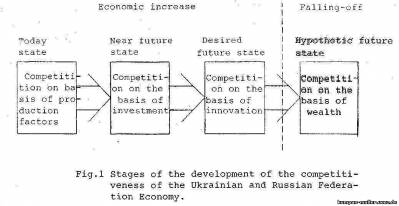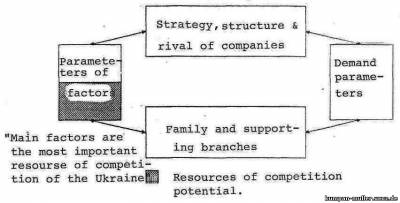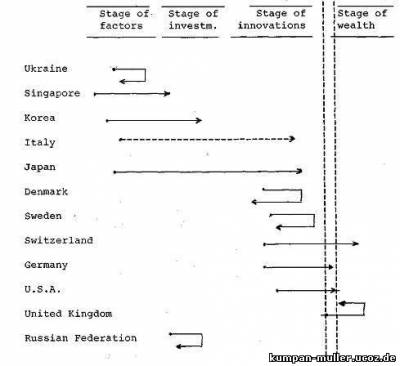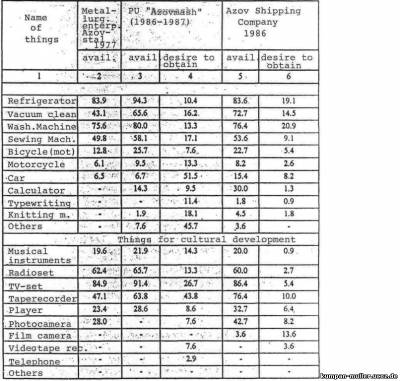Alexander Vasiljev-Muller Dr.econ(PhD)
Publisher
| Главная » Статьи » Law-Preservation-labour / "Все богатство из Труда"(Библия) по Закону Сохранения Труда |
METHODOLOGICAL PRINCIPLES OF THE SYSTEM OF MAINTENANCE AND RISE OF COMPETITION ABILITY/PRUSIKOV SERGEY VICTOROVICH- II Part
II. THEORATICAL AND METHODOLOGICAL ASPECTS OF MAINTENANCE AND RISE OF COMPETITION ABILITY.
The professionals of the West Europe consider that the central economic problem of each country should be the achievement of high competitivenes and production. We fully agree with the former achievement and not completely with the second one. We think it would be properly to consider the problem of productivity wider and to highlight the improvement of the effectiveness as a system of integrated indications reflecting more the functioning of the service sphere.
The Ukraine, a young independent country, is now in its proceeding to higher level of competitiveness and effectiveness. These problems can be showed as a number of questions faced by the country and making its national priorities.
Briefly speaking, in compliance with the definition of the American political scientists (Moscow,1991) the Ukraine, as well as Russian Federation,are typical industrially developed backward countries, and not simply backward countries, that puts them into the first level of economic development, according to the classification offered by Michael Porter (M.Porter.Ind.work -p.586).
In economic literature the problems! of the development are illucidated insufficiently (I.V.Bestuzhev-Lada. Normative social forecasting:possible ways of realization of aims of the society. _M.Science,1987; Social indicators of the lifestyle of the Soviet society/Ed. Bestuzhev-Lada I.V.-M/Science,1980.) and the attention is mainly paid to the process of economic development from agricultural to industrial (S.V.Emelyanov,E.L.Nappelbaum,Systems, expediency,reflection, in the book:Systems researches.Methodological problems. Annual -M.:Science,1981; I.A.Stassman. Information and the century of electronics - M. Economics,1987. ) stage. And in the West literature to post industrial stages. And there are completely absent in scientific circles any fundamental works of Russian Economic school (M.Vol'sky, Sh.Garnie, V.Dmitriyev, M.Tugan-Baranovsky,etc...) that, by deep comprehensive social and economic analysis,had given a picture of dominating tendencies during the transformation of economy of Russia in XIX century.
Their works ,as we can see,give us the opportunity/at many modern processes in a different way.
But, for the present, we put the narrower task,namely:to find out, for which main factors account the economy of the Ukraine,particular, can keep maintaining and even developing the competitivenes of the sea transport ? But we should not consider this problem separately from the whole picture. We should appraise it as a single whole.
It is evident that economic growth depends on the efficiency of utilizatior of national resources determining the effectiveness of labour in branches and segments of national economy wherein the enterprises and organizations can succes-fully compete. Any national economy, and the Ukraine is not excluded, has got a number of branches possessing various sources of rise of their competition ability. Even if the U.S.A. and Germany have got industries which keep firmly preserving their position in a competition only thanks to their national resources, then the Ukraine must use its potential resource.
For the time being the economy of the Ukraine enters the period of time when the basis of the future transfer from production factors to investments and innovation can be laid. (Pis.see Fig. 1 ). The burden of the outstanding problems of the former U.S.S.R. fell epon the shoulders of the young national state whose industrial potential is headed to capacious but not stable market of Russian Federation. Simultaneously, in the Ukraine an integrated restructure of industrial megapo-lis is necessitated to ensure the stability of complicating social structure of the society and competitiveness of traditionally developed branches in the industrial state.
In many branches of the Ukrainian economy there are fundamental advantages (inspite,of widely advertised backwardness) such as the level of engineering education, exceptional diligence and modestness of specialists. But, physically and morally worn fixed funds create hard surmountable obstacles for managers and businessmen practically in all branch es of national economy and does not make it possible to adhere the whole European standards. Even today the Ukraine is confronted with the necessity of competition development on the basis of production factors,i.e. on so called "first stage of development of national economy competitiveness " ,but with some deviation to the level of defences development.
If we use the methodology of approaches of Michael Porter, we can see that in competition "rhomb" the state of factors of the Ukrainian economy can only provide competition advantages ( Pis see Fig.2) . The model is extremely simplified, but very convincingly shows that leaning against the production factor sharply lessens the number of industries capable to bear the burden of international competition.Just to such industries the sea transport of the Ukraine belongs and that should not be forgotten.
Upon the whole, such development competition exists only on the grounds of reduction of prices on production requiring simple , cheap and acceptable foreign technology. The access to foreign market is provided mainly by foreign companies and national demand for exported production may not be available. That is particularly observed now in the development of a "charter" of the leasehold Azov Shipping Company.
Fig.2 National economy of the Ukraine determined by the state of factors.
At this stage the economy greatly depends on the world state of market ( on currency rate changes and so on ) and even the availability of big national resources does not ensure stable increase. By the way, own cheap fuel oil stock of the Black Shipping and Azov Shipping Companies determined their high level of competitiveness even in 1989-1990.In the Ukraine it can be expected widening of the range of imported goods substitutes due to protective measures, but as the world experience confirms that can't help to avoid reduction of the efficiency of the economy and the increase of the blackwardness. By the way, very small quantity of countries who had overcome the stage of factors. (Pis see Fig.3).
Fig.3 Development of competition ability of the economy of a number of the countries in postwar period.
2.1. How the sea transport of the Ukraine should compete ?
The legacy of the national "rhomb".
Sea fleet is a transport industry which dynamically developed in postwar period.Particularly, the transport of Japan and Korea intensively expanded their shares in the world transport from 1976 fiSXJL 1985, but such countries as the United Kingdom, Germany and the U.S.A. had lost their shares. That means that it is necessary to apply to and learn the experience of competitiveness increase advantages of Japanese and Korean companies, i.e. in the East.
If to start to research the origin of competition advantages through the concept of industry clusters, then the shipbuilding industry should take up a substantial room in the "transport" cluster. That's why it is not surprising that even in 1985 the share of Japan in common world export of tankers made 31.7 per cent with a cost of USD 767,626,000 (when the import cost made 13,116,000 USD), while the share of cargo ships of the U.S.A. in the world export made 36,9 per cent with the cost of USD. 4, 545. 449,000 (when the import cost made USD 3,296,174,000). All that confirms a great importance of family and supporting branches of so called " base of transport cluster" in the maintenance and increase of the competitiveness of the sea transport. Just because of that Japan in the world export of other cargo ships practically does not let the U.S.A. pass ahead of it and its share makes 35,7 per cent with a cost of USD 4,399,729,000 (when the import cost makes USD 216,601,000) at the extremely low share of tankers, as well as other ships. Unfortunately, we can not apply the approach experience of the developed countries to the economy of the Ukraine, because the family and supporting industries including shipbuilding industry in the transport cluster is,at best, in state of stagnation. Consequently, national "rhomb" basis of the Ukraine for the sea transport today are evidently, shiprepairing yards and repairing devisions, which certainly provide the least level of the support to the compe-titiveness of the sea transport. That causes thepriority in consideration of so called"inter factors" determining the com-patitiveness as the only reliable source of its maintenance.
Specialists in international competition suppose that creating the factors is successfully carried out in those countries wherein a deep understanding of the importance of their economic prosperity and a real consensus in constant investments exist. Let's suppose, a priori, that the Ukraine is becoming such a country, and this research will speed up this process.
The most sugnificant factors among all factors are education and training. It is evident that integrated competition advantages can be reached only with the help of the employees of higher skills. In this aspect it is reasonable to establish higher education standards.In conditions of a transverse to market methods of managing, that means a higher leve of training of specialists dealing with business. In sea transport that means steps increasing the quantity of specialists graduated from universities, passed their practice experience abroad, enthusiastically working in scientific and research institutes and different public academies. For example, a leasehold Azov Shipping Company not only increases the number of specialists having passed their practical study in Italy, Greece, France and other countries, but having finished their study at Mariupol Humanitarian Institute of Donetsk State University. Four leading professionals of the leasehold Azov Shipping Company are members of the Scientific Council of the Institute of Economic, Social and Cultural Researches (of Donetsk Foundation of Culture and DSC NAS of the Ukraine). And the section of the Scientific Council of the Institute of Economic and Legal Research NAS of the Ukraine. And for the present two managers have academic degrees of public academies and render assistance in establishment of the Represenation of the Academy of Economic Sciences and Business of Russia in the Ukraine. For example, the leasehold Azov Shipping Company in the person of AZCO-Trans is an associated member of AES&E of Russia (Doctor of Commerce V.E.Ushkalov ). In modern conditions this is actually maximum possible activity of the managing structures realized for creation of one of the leading factors of maintenance and rise of the competitiveness.
The second in its significance factor abroad is a science and technology and the main aim of the Government is to stimulate the improvements in science and technology when research and elaboration work cannot be rendered only to enterprises and organizations. So,the developed countries worked out and put into practice special policy directed tor motivation of the research work. For example, Germany partially finances research projects effected in firms and at the same time gives financial guarantees to the institutes; the U.S.A. spends billions of dollars for research work in Federal laboratories and so on. But special meaning has the understanding in all levels of management of iffl the concept that it isypossible to separate science and technology from their commercial realization that actually strengthens national advantages as far as commerce pertains to the whole national "rhomb" (!).
In spite of all existing problems, modern tendencies make their way in the sea transport of the Ukraine.For example, the National Agency of Maritime Research and Technology of the Ukraine has approved and is implementing through academic and branch institutes the "National Programme of Research and Utilization of the Resources of the Azov-Black Seas Basin, other regions of the world ocean till 2000", wherein the problems of the scientific and technological provision of sea transport are being studied and worked out.
Hence, in the U.K.,U.S.A.,Germany the emphasis is mostly made on universities, i.e. the governmental capital investments are mostly made through the universities comprising research institutes. Similar approach, but comprising co-operation of scientific and instructing organizing structures in C.I.S was realized in Mariupol in 1989 when oft the initiative of men of science and culture of Donbass the academician of the Ukraine N.G.Chumachenko, the academician of AES&E of Russia A.V.Vasilyev, Vice-Rector of Donetsk State University Professor V.V.Christianovskiy, scientific worker P.S.Golik, an Honoured Worker of Cultu're V.N.Puglo with the support of the Authorities of Mariupol and Donetsk Region, a Donetsk Experimental Scientific and Methodic Centre was established, and in 1991 re-organized into the Institute of Economic, Social and Cultural Research (Donetsk Foundation of Culture and DSC NAS of the Ukraine). It is headed by the Assistant Professor of Pri-azovsky State Technical University, Doctor of Commerce of Russia, Candidate of Economic Science, h.scis.empl. Vasiljev Valery Alexandrovich, i.e. the Institute has a juridical status and does not depend on libertarianism of bureaucrats in education and science,but has deep connections with the university science. So, a leasehold Azov Shipping Company, as well as sea ports of Priazovye and the Crimea collaborated and continue to collaborate with the Institute of Economic, Social and Cultural Researches and as a result of their collaboration the idea of establishment of Free Economic Zone in Kamyshovaya Bay (Sevastopol city) and a project of establishment of Free Economic Zone "Azovye" (Mariupol city) are under consideration of the Supreme Soviet of the Ukraine. But a particular interest is attracted by a complex of elaborations on marketing, as well as arrangement and making repairs and modernization of fixed assets mentioned below.
We can surely affirm that the Europian experience of factor competition ability in science and technology is successfully used in the sea transport of Priazovye and gives a substantial efficiency in the leasehold Azov Shipping Company.
The significance of infra-structure in modern economy is steadily increasing. The most decisive course for investments into infra-structure was made by Japan, Korea, and Singapore (M.Porter,Ind.work-p.691 From the data represented by the Ministry of Foreign trade and industry of Japan,Hitotsubash University,Industrial Bank of Japan,Ceul National University,Singapore Council of economic development,Harward School of Business.), to their benefit. Other countries made their investment volumes insufficiently, but still less volumes were invested in the Ukraine and Russia where a leader was a Government (as in a: number ofvcountries of і the world). But today the privatization is proceeding on a large scale. So, the investments even into construction of special structures are not of state character.Inspite of a difficult financial situation the leaders of the sea transport of the Ukraine had arranged an organizing and preparatory work,specifically, the Azov Shipping Company has become a leasehold company, but, unfortunately, we have not succeeded in further steps for the time being.
Quite another picture is with the social infrastructure created and supported by the sea transport of the Ukraine. Specifically, the social infrastructure of the leasehold Azov Shipping Company matches social and cultural requirements of the seamen leaving in Primorsky Region of Mariupol city. As we can see (Table 1) the level of seamen's needs was considerably higher as among the whole city population , as in the whole industry. The same can be said about the level of satisfaction connected with the less standard of living in C.I.S. than in the countries of the West Europe and U.S.A. But we are interested in the principle of the approach to lncreasing of a social infrastructure itself as a source of competition advantages of one or another enterprise or a company as a way of reaching a special standard of living ( not always higher ) for the staff members of the company and their families. Just in that aspect the "Marks and; Spencer" experience was analised in due time. The company had reached a high level of competitiveness.They believed that their special company approach to creating a social infrastructure (from doctors' rooms to tourists routes and the policy of "sympathy") was something specifically new. But sociologists of native socio-logical and socio-economic school (Chumachenko N.G., Vasilyev A.V., Erashev A.X. and others. Rise of effectiveness of social policy on the enterprises of industrial regions in the light of principle restructuring of work with youth. Mariupol, Donetsk, Moscow: of labour, UkSSR, of the UkSSR, 1989-p.300; Bestuzhev-Lada I.V.Poluhin V.P.ahd others Programme of social ebsurance (perspectives of mastering of lazer treatment)Moscow, Tula, Mariupol: USSR, Tulachermet,1986-p 114; Chumachenko N.G. Vasiljev A.V. Edzhibadze O.I. Sociam problems of industrial centres. Mariupol, Donetsk, Moscow: of the UkSSR.1988 -p.l57, Vasilyev V.A. Methodological Problems of perfection of labour expenditure, Donetsk, Donbass,1992-152p.) did not consider that concept as a new one. They recognized it as already used in the ex-U.S.S.R in the 30-ties when it was necessary to solve a number of problems for creating a minimum social conditions for staffs of industrial giants (Magnitogorsk Metallurgical Works, Mariupol Metallurgical Enterprise named after Ilyich, Azovstal' and others ). In the 60-ties by similar way the level of social and cultural service of people was raised in industrial centres. (Magnitka, Lipetsk, Mariupol, etc.) In the sea transport industry, besides this aim, there always existed a more complicated aim: to decrease negative influence of rather high seamen's earnings ( in comparison with other national industry branches) on social and psycological situation of the region, for the account of bureacratic infrastructure. So, not only in German Federal Land Baden-Viurtemberg, but even in Mariupol such investments played and continue to play a considerable role in social and economic policy.There are many positive, as well as negative points as far; as the formation of such cluster social infrastructure gives rise to exceptional difficulties during a restructuring of industries of national economy.Just such a phenomena is met with in Donbass. The cluster development on the grounds of social infrastructure of industrial giants with a high degree of the production concentration promotes the creation of special formations with sophisticated hierarchic (Vasiljev A.V. The origin of ethnic and social managing layer of Russia. Mariupol, ,1996 (1994)- p.42.). structure around one or another enterprise" that intensifies negative effect of the accelerated economic development creating pre-conditions for unjustified ethic and social separateness. Hence, the latter on the territory of C.I.S did not cause spontaneous centres of micro-ethnic and genetic development and simply decreased the level of social activity in entire regions. That resulted in the infantile approach to the settlement of regional social and economic problems in industrial centres of C.I.S. (Mariupol, Zaporozhye and so on ) on the side of the working staffs of industrial giants (proving is a relation of the staff of Mariupol Metallurgical Enterprise "Azovstal1 " to ecological problems, and so on).Similar indifferent and contemplative position is taken by the seamen in their relation to regional problems intensified by the results of their personal comparative analysis.And the role of formation of inertia position of the regional population of departmental social infrastructure of the sea transport seems to be not so significant in comparison with the influence of the specific character of labour activity itself.
Availability in every day life of things of long-term use and a desire to obtain such things ( in per cents from a number of questioned ) //(Vasilyev A.V. Efectiveness of the systems of stimulation in industry-Moscow-Mariupol; AON 1991- p. 256-257).
Table 1.
Professionals of the West consider that one of the factors increasing the competition ability is the availability of of the capital of great scale and at a really low price. If to separate from a propaganding mirage of the ways of gaining and stocking the capital then the experience of the Black Shipping Company deserves special attention and the process of shareholding in one or another form is a real source of the capital for investing of national programmes of fleet renewal by empowering production output of shipbuilding industry of the Ukraine. The capital can be gained by different ways.For example, in Singapore it was obtained by means of the programme of enforced savings through the system of social ensurance ( that makes a huge capital reserve ).This problem can be solved for the account of tax policy. For example, it can be developed a system of incentives for private saving having freed them from taxes,as it was in Japan. We are interested in the experience of Korea, as well as Japan which transferred to the stage of the development based on investments through the system of borrowing the capital by the. Government and then investing them into necessary industries. The leasehold Azov Shipping Company have developed its own particular way of finding capital sources showed in Part 3.
In any case the problem of finding capital is not absolutly insoluble, as the population is .reported by mass media means and the formation itself deserves a more serious concern.Creation of information base is a key problem of maintenance and rise of competitiveness of the sea transport.In this aspect attention should be paid to Mariupol Shipping Company "Cometas" wherein it seems to work the most qualified brokers of Priazovye having special and good grounding.
For the Azov Shipping Company the essential reserve of rising of effectiveness and quality of information is the improvement of the cooperation with foreign representations, to pursue through them publicity compaigns by means of special schemes and collection of relative information on the outcome of all kinds of advertising activity. Specifically, the Authorities of AZCO-Trans of AZSCO are making their best efforts in implementing of this direction of information provision.
In the light of the above one can come to conclusion that parameters of factors determining the level of competitiveness of the sea transport which can be considered as a so called "legacy of national "rhomb", on the whole, are on sufficiently high level, particularly, in the leasehold Azov, Shipping Company. So, it is possible to speak about rather high level of the potential competitiveness of shipping companies based in Mariupol and in the first place, of a leasehold Azov Shipping Company.
The task set before the working staff of the Azov Shipping Company is to discover that potential and increase a living standard of seamen and their families adhering to International Conventions. Источник: http://iescr-catholic.ucoz.de/publ | |
Категория: Law-Preservation-labour / "Все богатство из Труда"(Библия) по Закону Сохранения Труда | Добавил: Vasiljev (2011-02-21)
| Автор: S.V.Prusikov  
| |
| Просмотров: 1072 | Теги: | Рейтинг: 5.0/1 | |
| Всего комментариев: 0 | |
Приветствую Вас Гость
Форма входа |
|---|
Категории раздела | |||||||
|---|---|---|---|---|---|---|---|
|
Поиск |
|---|
Наш опрос |
|---|
Статистика |
|---|
Онлайн всего: 1 Гостей: 1 Пользователей: 0 |
Друзья сайта |
|---|
|
|



